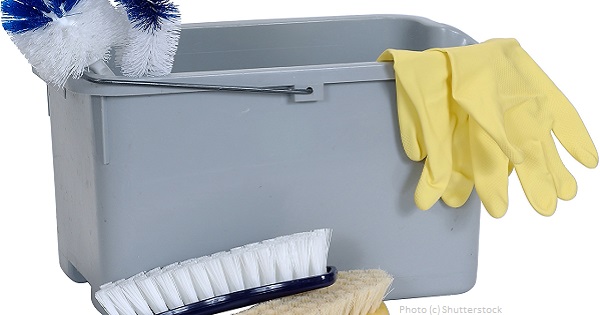|

Do-It-Yourself Healthy Cleaning Alternatives
Commercial cleaning supplies can be highly toxic to both human health and the environment. You can avoid using those products, and save money too, by making your own natural cleaning supplies at home using common, food-grade materials.
- Salt will take out wine or fruit stains.
- Club soda will remove lighter colored stains.
- Baking soda and cornstarch make good deodorizers.
- Clean your oven with a paste of baking soda, salt, and water.
- One part water to one part vinegar in a spray bottle will clean most areas of your home.
- Remove toilet bowl stains with vinegar.
All-Purpose Cleaner
2 cups white distilled vinegar
2 cups water
20 drops of essential oil (optional)
Warming until lukewarm will boost cleaning power for tough jobs. Useful for countertops, appliances, windows, mirrors.
Creamy Scrub Cleanser
2 cups baking soda
½ cup liquid castile soap
4 teaspoons vegetable glycerin (optional but acts as a preservative)
5 drops antibacterial essential oil such as lavender, tea tree, rosemary (optional)
Stores up to two years in a sealed glass jar. For exceptionally tough jobs, spray with vinegar first, let sit and follow with scrub. Great for kitchen counters, stoves, bathroom sinks.
Furniture Polish
¼ cup white vinegar
a few drops of olive oil
2 teaspoons lemon juice
Store in refrigerator. Shake well before using. Dip a clean, dry cloth into the polish and rub wood in the direction of the grain.
Drain Opener
½ cup baking soda
½ cup white vinegar
Pour baking soda down the drain and follow with vinegar. Cover and let sit for at least 30 minutes. Flush with boiling water. Repeat if necessary
Notes:
Although many of our readers like to use Borax in their handmade cleaning products - especially for laundry - it can be toxic and has been recently classified as a reproductive toxin. Sufficient exposure to borax dust can cause respiratory and skin irritation. Ingestion may cause gastrointestinal distress including nausea, persistent vomiting, abdominal pain, and diarrhea. So we do not recommend its use.
The use of essential oils is controversial and not necessary to the effectiveness of these formulations. Exposure can cause breathing problems for children and for some people with asthma or other respiratory problems or sensitivities. Most sources say that pregnant and nursing women should avoid many essential oils. Additionally, many of the plants used to make essential oils are gathered from the wild, which is decimating some species, such as rosewood and sandalwood.
For more information on this topic and other sustainable housing issues, read our book Natural Life Magazine's Green and Healthy Homes.
|

